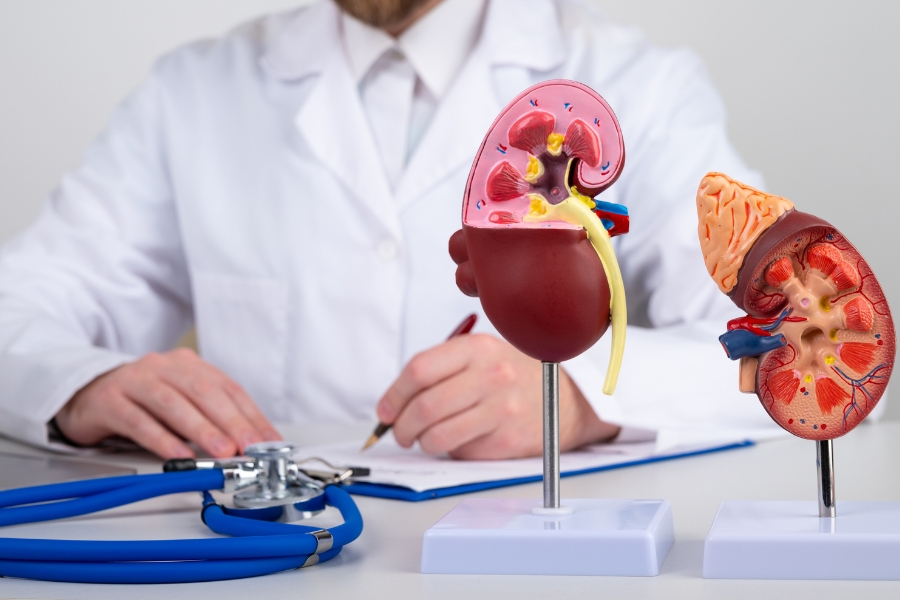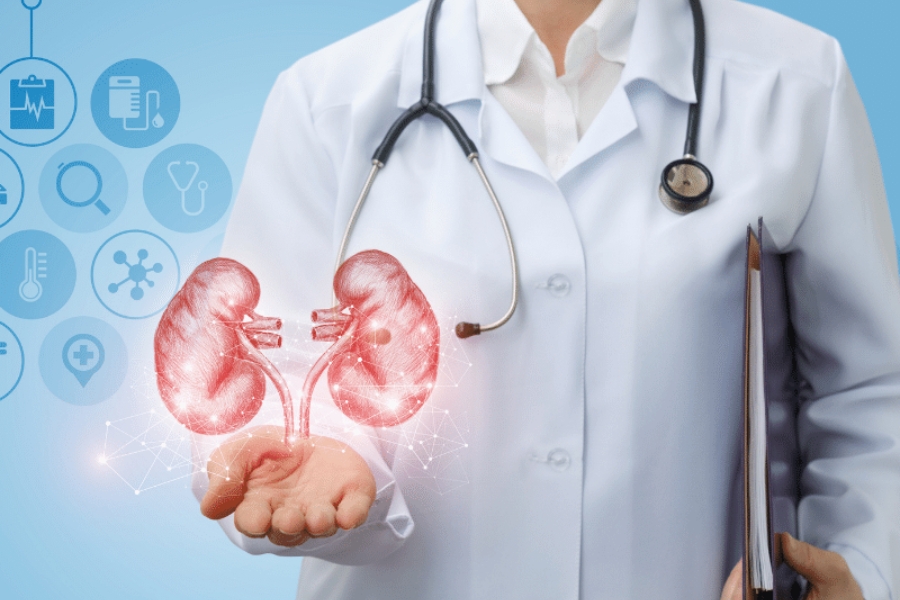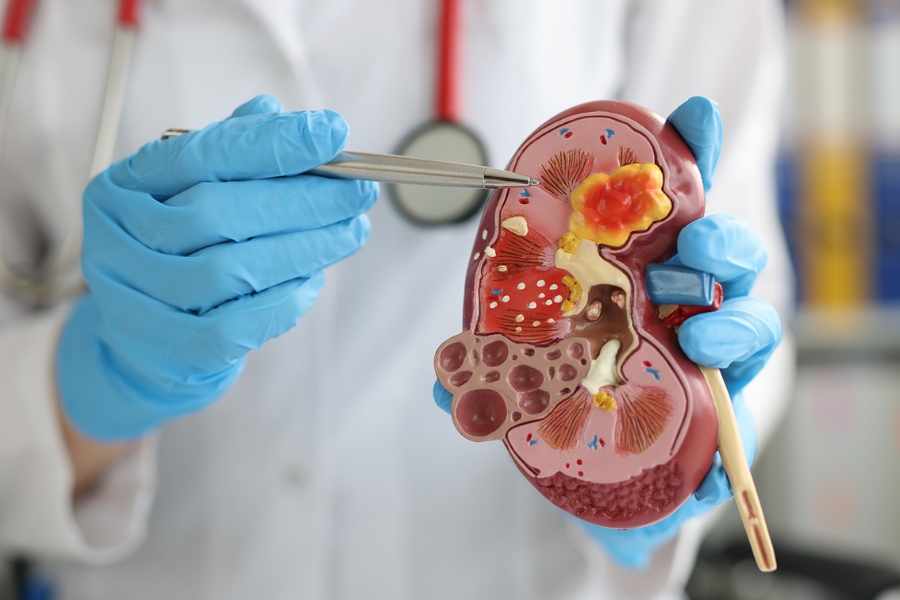The Link Between Blood Pressure and Kidneys
Hypertension, commonly known as high blood pressure, is a major risk factor for kidney damage. But did you know that your kidneys also help regulate blood pressure? This two-way relationship makes it essential to take care of both. When blood pressure remains high over time, it can silently damage your kidneys, leading to chronic kidney disease (CKD) or even kidney failure. Fortunately, this condition is preventable and manageable with timely care.
How Do Kidneys and Blood Pressure Work Together?
Your kidneys filter blood, remove waste, and control fluid balance. They also help regulate blood pressure through the renin-angiotensin-aldosterone system. This system adjusts blood vessel tension and fluid levels.
If you have high blood pressure, it can:
- Narrow blood vessels in the kidneys
- Reduce blood flow to kidney tissues
- Damage tiny filtering units called nephrons
Over time, this leads to reduced kidney function, protein leakage in urine, and in severe cases, end-stage kidney disease.
Warning Signs: Is Your Kidney Health at Risk?
Hypertension often shows no symptoms, and early kidney damage is also silent. However, some signs may include:
- Swelling in ankles, feet, or around the eyes
- Frequent urination at night (nocturia)
- Foamy or bloody urine
- Persistent fatigue
- High creatinine levels in blood tests
If you have these symptoms along with high blood pressure, you must consult a nephrologist.
Who’s Most at Risk?
Certain conditions and lifestyle factors can increase the risk of kidney disease in people with hypertension:
- Diabetes
- Family history of kidney problems
- Smoking
- Obesity
- Sedentary lifestyle
- Overuse of painkillers (NSAIDs)
Tips to Protect Both Kidneys and Blood Pressure
Now that we understand the connection, here are actionable tips to preserve both kidney and heart health:
1. Cut Down on Salt
Excess salt increases fluid retention and raises blood pressure.
Goal: Limit sodium intake to less than 5 grams per day.
Tips:
- Avoid processed and canned foods
- Read labels for sodium content
- Replace salt with herbs and spices
2. Stay Physically Active
Exercise improves blood circulation and helps lower blood pressure.
Recommended: 30 minutes of moderate activity (walking, cycling, yoga) 5 days a week.
Bonus: It also helps control weight and blood sugar levels—both essential for kidney health.
3. Stay Hydrated — But Smartly
Drinking adequate water helps your kidneys flush out toxins.
Ideal Intake: 8–10 glasses a day, unless you have kidney issues where fluid restriction is advised.
Note: People with CKD should consult their doctor for fluid management.
4. Eat a Kidney-Friendly Diet
A healthy diet helps control blood pressure and protects kidney function.
Include:
- Fresh fruits and vegetables
- Whole grains
- Low-fat dairy
- Lean proteins like fish or tofu
Avoid: - High-sodium snacks
- Sugary drinks
- Red meat
Foods high in phosphorus and potassium (if you have CKD)
5. Take Medications as Prescribed
Some blood pressure medicines like ACE inhibitors or ARBs are kidney-protective. Never skip or self-adjust medications.
Regular monitoring of BP and kidney function (creatinine, GFR) is necessary.
6. Quit Smoking
Smoking narrows blood vessels and accelerates both high BP and kidney damage. Quitting has immediate and long-term benefits.
7. Limit Alcohol
Excess alcohol raises BP and harms kidney tissue.
Limit:
- Men: 2 drinks/day
- Women: 1 drink/day
8. Manage Stress
Chronic stress raises cortisol, indirectly increasing BP.
Try:
- Meditation
- Deep breathing
- Journaling
Counselling, if needed
9. Get Regular Health Checkups
Annual kidney and blood pressure checks can help detect early damage.
Important tests:
- Blood pressure readings
- Urine test (protein, albumin)
- Blood creatinine
- Glomerular Filtration Rate (GFR)
When to See a Nephrologist?
If you have:
- Uncontrolled high BP
- Protein in urine
- High creatinine
- Family history of kidney disease
- Swelling or persistent fatigue
Consult a nephrologist early. Timely intervention can slow or prevent progression of kidney disease.
Summary: Your Daily Checklist
|
Action |
Benefit |
|
Limit salt |
Lowers BP & kidney strain |
|
Exercise daily |
Improves heart & kidney function |
|
Hydrate properly |
Flushes toxins |
|
Eat balanced diet |
Supports overall health |
|
Monitor BP & labs |
Detects early damage |
|
Quit smoking |
Improves circulation |
|
Take medicines |
Controls BP & protects kidneys |
Conclusion: Prevention Is Powerful
Hypertension and kidney disease can silently damage your body. But with consistent lifestyle changes, regular monitoring, and expert guidance, you can manage your blood pressure and preserve kidney function for years to come.
Be proactive. Be preventive. Your kidneys and heart will thank you.






1 Comment
Your comment is awaiting moderation.
Share our products and watch your earnings grow—join our affiliate program!
Your comment is awaiting moderation.
Join our affiliate community and maximize your profits—sign up now!
Your comment is awaiting moderation.
Drive sales, earn commissions—apply now!
Your comment is awaiting moderation.
What’s up, gamers? Been messing around on mv99 and it’s a solid option. Good selection of games, responsive customer support. Worth a punt! Check it here mv99!
Your comment is awaiting moderation.
Monetize your audience—become an affiliate partner now!
Your comment is awaiting moderation.
Turn your traffic into cash—join our affiliate program!
Your comment is awaiting moderation.
ffqnivenogqjmmxrqlhxmmuwzrnrdr
Your comment is awaiting moderation.
kegepmdxunlnpoxjnxlrrmdwnqjexf
Your comment is awaiting moderation.
https://shorturl.fm/bCqJm
Your comment is awaiting moderation.
https://shorturl.fm/36hnl
Your comment is awaiting moderation.
https://shorturl.fm/rsYcH
Your comment is awaiting moderation.
https://shorturl.fm/oW1q6
Your comment is awaiting moderation.
https://shorturl.fm/OoOi3
Your comment is awaiting moderation.
https://shorturl.fm/6JDGb
Your comment is awaiting moderation.
https://shorturl.fm/kuOl2
Your comment is awaiting moderation.
https://shorturl.fm/Yyw1E
Your comment is awaiting moderation.
https://shorturl.fm/EnAMF
Your comment is awaiting moderation.
https://shorturl.fm/j8IIj
Your comment is awaiting moderation.
https://shorturl.fm/DFmEc
Your comment is awaiting moderation.
https://shorturl.fm/btLzD
Your comment is awaiting moderation.
https://shorturl.fm/ECuRA
Your comment is awaiting moderation.
https://shorturl.fm/JwyqX
Your comment is awaiting moderation.
https://shorturl.fm/bNCHs
Your comment is awaiting moderation.
https://shorturl.fm/F7n2k
Your comment is awaiting moderation.
https://shorturl.fm/k2xsp
Your comment is awaiting moderation.
https://shorturl.fm/Hq6rV
Your comment is awaiting moderation.
https://shorturl.fm/DnTdu
Your comment is awaiting moderation.
https://shorturl.fm/Ig2ny
Your comment is awaiting moderation.
https://shorturl.fm/na7if
Your comment is awaiting moderation.
https://shorturl.fm/0Jpyd
Your comment is awaiting moderation.
https://shorturl.fm/caXkH
Your comment is awaiting moderation.
https://shorturl.fm/ybhcx
Your comment is awaiting moderation.
https://shorturl.fm/kxAuo
Your comment is awaiting moderation.
https://shorturl.fm/caXkH
Your comment is awaiting moderation.
https://shorturl.fm/XIUlv
Your comment is awaiting moderation.
https://shorturl.fm/eqcQL
Your comment is awaiting moderation.
https://shorturl.fm/2eUM8
Your comment is awaiting moderation.
https://shorturl.fm/JtLxk
Your comment is awaiting moderation.
https://shorturl.fm/KnoqL
Your comment is awaiting moderation.
https://shorturl.fm/RWUwn
Your comment is awaiting moderation.
https://shorturl.fm/nWHCx
Your comment is awaiting moderation.
https://shorturl.fm/KzTry
Your comment is awaiting moderation.
https://shorturl.fm/Q5fw2
Your comment is awaiting moderation.
https://shorturl.fm/twpAr
Your comment is awaiting moderation.
https://shorturl.fm/wvzhn
Your comment is awaiting moderation.
https://shorturl.fm/wvzhn
Your comment is awaiting moderation.
https://shorturl.fm/Uyr3k
Your comment is awaiting moderation.
https://shorturl.fm/okt4I
Your comment is awaiting moderation.
https://shorturl.fm/ptVVr
Your comment is awaiting moderation.
https://shorturl.fm/C0V0g
Your comment is awaiting moderation.
https://shorturl.fm/XBxAy
Your comment is awaiting moderation.
https://shorturl.fm/93dBl
Your comment is awaiting moderation.
https://shorturl.fm/klabT
Your comment is awaiting moderation.
https://shorturl.fm/eW0LO
Your comment is awaiting moderation.
https://shorturl.fm/ProZr
Your comment is awaiting moderation.
https://shorturl.fm/zhD0A
Your comment is awaiting moderation.
https://shorturl.fm/q1EHH
Your comment is awaiting moderation.
https://shorturl.fm/xM2YX
Your comment is awaiting moderation.
https://shorturl.fm/yGicU
Your comment is awaiting moderation.
https://shorturl.fm/tLCif
Your comment is awaiting moderation.
https://shorturl.fm/HelNz
Your comment is awaiting moderation.
https://shorturl.fm/312Jf
Your comment is awaiting moderation.
https://shorturl.fm/QPd5u
Your comment is awaiting moderation.
https://shorturl.fm/qfc6R
Your comment is awaiting moderation.
https://shorturl.fm/Oo7Jr
Your comment is awaiting moderation.
https://shorturl.fm/FwSOm
Your comment is awaiting moderation.
https://shorturl.fm/GBBXv
Your comment is awaiting moderation.
https://shorturl.fm/5B5ke
Your comment is awaiting moderation.
https://shorturl.fm/Alkmh
Your comment is awaiting moderation.
https://shorturl.fm/NtEkm
Your comment is awaiting moderation.
Promote our products—get paid for every sale you generate! https://shorturl.fm/LZXyy
Your comment is awaiting moderation.
Start earning on autopilot—become our affiliate partner! https://shorturl.fm/TRTin
Your comment is awaiting moderation.
Turn your network into income—apply to our affiliate program! https://shorturl.fm/mzuup
Your comment is awaiting moderation.
Tap into unlimited earnings—sign up for our affiliate program! https://shorturl.fm/UOupU
Your comment is awaiting moderation.
Promote our brand, reap the rewards—apply to our affiliate program today! https://shorturl.fm/VvEJs
Your comment is awaiting moderation.
Unlock exclusive affiliate perks—register now! https://shorturl.fm/4Fjbo
Your comment is awaiting moderation.
Partner with us and earn recurring commissions—join the affiliate program! https://shorturl.fm/2J8aR
Your comment is awaiting moderation.
Turn referrals into revenue—sign up for our affiliate program today! https://shorturl.fm/f7AM8
Your comment is awaiting moderation.
Partner with us and enjoy recurring commission payouts! https://shorturl.fm/NDhZG
Est optio exercitationem aut perferendis enim aut. Aut tenetur necessitatibus rerum dolores Fugit quis aut ut aspernatur Praesentium rerum pariatur voluptas corrupti vel. Est rem fugit expedita laboriosam velit. debitis ex inventore perferendis amet. Non voluptates architecto tempore quo. Nisi omnis praesentium at fugit. ut inventore rerum quo error placeat. dolor aut molestiae Accusamus similique modi repellat voluptate atque. Corrupti tenetur quos aut. nostrum eum autem unde. Dolor consequuntur esse commodi ad Et eos atque velit vel.